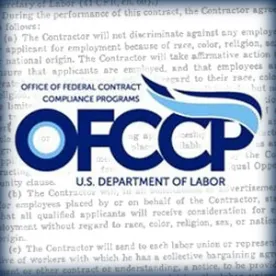There has been lot of talk in the months since OFCCP released Directive 2022-01: Advancing Pay Equity Through Compensation Analysis, with the topic of attorney-client privilege being the primary topic of concern. So much so that OFCCP Director Jenny Yang addressed the issue in her remarks last month at the NILG National Conference. Today, OFCCP released a revised version of Directive 2022-01 that addresses the issue further and describes additional types of documentation contractors can provide in the course of an audit to demonstrate compliance with their obligation to review their “compensation system(s)” under 41 CFR 60-2.17(b)(3), including submission of a detailed affidavit in lieu of producing an analysis.
Director Yang shared in a blog post the major changes of the revised directive:
-
It explicitly reaffirms the agency’s position that it does not require the production of attorney-client privileged communications or attorney work product.
-
It identifies the documentation that OFCCP requires from a contractor to determine that the contractor has satisfied its obligation to perform a compensation analysis.
-
It explains the documentation required from a contractor when its compensation analysis identifies problem areas to demonstrate that it has implemented action-oriented programs.
In addition, Director Yang explained
(i)n addition, although the original Directive used the phrase “pay equity audit” to refer to contractors’ obligations under 41 CFR 60-2.17(b)(3), this revised Directive instead uses the term “compensation analysis” to avoid any confusion regarding the nature of a contractor’s obligations.
With respect to acceptable documentation demonstrating compliance “[i]f a contractor believes its full compensation analysis contains privileged attorney-client communications or attorney work product” , the Directive provides that contractors now have three options to demonstrate compliance:
-
A contractor may make available a redacted version of its compensation analysis, provided that the non-redacted portions include the required facts described below.
-
A contractor may conduct a separate analysis during the relevant AAP period that does not implicate privilege concerns and provide that analysis to OFCCP in full.
-
A contractor may generate a detailed affidavit that sets forth the required facts described below but does not contain privileged material.
At a minimum, contractors must provide the following details to OFCCP to demonstrate compliance:
-
when the compensation analysis was completed;
-
the number of employees the compensation analysis included and the number and categories of employees the compensation analysis excluded;9
-
which forms of compensation were analyzed and, where applicable, how the different forms of compensation were separated or combined for analysis (e.g., base pay alone, base pay combined with bonuses, etc.);10
-
that compensation was analyzed by gender, race, and ethnicity; and
-
the method of analysis employed by the contractor (e.g., multiple regression analysis, decomposition regression analysis, meta-analytic tests of z-scores, compa-ratio regression analysis, rank-sums tests, career-stall analysis, average pay ratio, cohort analysis, etc.).
In the course of the review, if a contractor’s compensation analysis identifies any problem areas (including gender-, race-, or ethnicity-based pay disparities), the Directive explains OFCCP will require documentation that demonstrates compliance with the regulations at 41 CFR 60-2.17(c) that require the contractor to develop and execute action-oriented programs to correct them. To demonstrate compliance, OFCCP will require at minimum:
-
the nature and extent of any pay disparities found, including the categories of jobs for which disparities were found, the degree of the disparities, and the groups adversely affected;
-
whether the contractor investigated the reasons for any pay disparities found;
-
that the contractor has instituted action-oriented programs designed to correct any problem areas identified;
-
the nature and scope of these programs, including the job(s) for which the programs apply and any changes (e.g., pay increases, amendments to compensation policies and procedures) the contractor made to the compensation system; and
-
how the contractor intends to measure the impact of these programs on employment opportunities and identified barriers.
The intent of OFCCP is not to obtain contractor’s privileged analysis, but the Directive makes it clear that
if a contractor does not provide OFCCP with documentation sufficient to demonstrate its compliance with 41 CFR 2.17(b)(3) on the basis that the required categories of information outlined in Section 7(b) are subject to the attorney-client privilege or work-product doctrine, OFCCP will find the contractor has not satisfied its obligations under 41 CFR 60-2.17(b)(3) and 41 CFR 60-2.10(c). OFCCP will not require the production of privileged attorney-client communications or attorney work product.
We will continue to analyze the Directive and share any further insights and clarifications as they develop.




 />i
/>i

